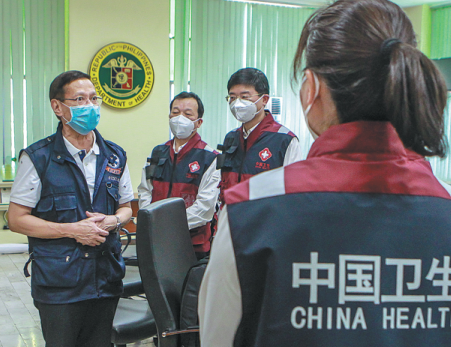China helps SE Asia dose up on optimism
By YANG HAN in Hong Kong | CHINA DAILY | Updated: 2021-01-15 09:42
Sharing of vaccines even more vital to developing nations at risk of missing out

After helping other Asian nations battle COVID-19, China is offering hope in a region looking to its supply of vaccines to turn the tide against the pandemic, especially in developing countries.
With countries across the world racing to roll out vaccination programs, Chinese vaccines will play an important role in helping developing nations in Asia to secure enough doses for their people, analysts said.
Chinese supply "will be the one that fills the gap" in COVID-19 vaccine distribution, said Henry Chan, visiting senior research fellow at the Cambodian Institute for Cooperation and Peace, a think tank in Phnom Penh.
He was referring to concerns expressed by some observers that less-developed countries may not gain the same level of access to vaccines as developed ones.
China has pledged that it will share its vaccines with the world, including the members of the Association of Southeast Asian Nations, or ASEAN.
Across Asia, the response to the pandemic has been better than in North America and Europe. Even in India, the worst-hit Asian country, the recorded number of deaths from COVID-19 was 151,727 by Wednesday, according to a tally kept by Johns Hopkins University.
For the eastern rim of Asia, heavily populated Indonesia is the worst-affected nation, with more than 828,000 confirmed cases and 24,000 deaths.
At the same time in North America, the death toll of the United States has eclipsed 380,000, according to Johns Hopkins University.
Analysts attribute the relatively good record on coronavirus control in East and Southeast Asia to the presence of strong and trustworthy governments. Disciplined residents have largely supported social distancing efforts.
For authorities in developing countries, China's vaccines present a cheaper option and the protection afforded by the current efficacy rates is good enough, Chan said.
Chan said Chinese vaccines had been tested in some of the worst-affected countries and on people in high-risk groups.
He said the fact that China has vaccinated many of its citizens at home, and those going abroad, indicates the effectiveness and safety of its vaccines.
China pharmaceutical company Sinopharm said its COVID-19 vaccine has an efficacy of 79.34 percent. Sinovac Biotech's CoronaVac showed 91.25 percent efficacy in clinical trials in Turkey, Xinhua News Agency said.
The minimum level required by the WHO for a placebo-controlled efficacy trial is 50 percent.
On Jan 8, WHO Director-General Tedros Adhanom Ghebreyesus reiterated the need for the equitable distribution of the COVID-19 vaccines among rich and poor countries.
"At present, 42 countries are rolling out safe and effective COVID-19 vaccines," Tedros said. "Thirty-six of these are high-income countries and six are middle-income. So there's a clear problem that low and most middle-income countries are not receiving the vaccine yet."
Chinese drugmakers-including Sinopharm, Sinovac and CanSino Biologics-will supply nearly 400 million COVID-19 vaccine doses to countries in Latin America, the Middle East and Asia, according to data compiled by British analytics firm Airfinity and the Duke Global Health Innovation Center in the US.
Indonesia's Food and Drug Monitoring Agency gave the go-ahead for Sinovac's vaccine, agency official Penny Lukito told an online news conference from Bandung, West Java, on Monday.
Indonesia began COVID-19 vaccinations on Wednesday. As many as 3 million doses of the Sinovac vaccine have been delivered to the archipelago, in addition to raw materials for 15 million doses that are to be produced in Indonesia.
Indonesian President Joko Widodo on Wednesday received the first of these shots.
Bambang Heriyanto, corporate secretary of Indonesian state-owned vaccine manufacturer Bio Farma, spoke highly of the cooperation between Sinovac and the company.
Bio Farma has been tasked with producing COVID-19 vaccines in Indonesia, using technology shared by Sinovac, according to Xinhua. The partnership carried out clinical trials across the country.
China's commitment to making the vaccine a global public good will help the world to curb the pandemic, Heriyanto said, adding that countries should work together to end the pandemic.
Aaron Jed Rabena, a research fellow at the Asia-Pacific Pathways to Progress, a foreign policy think tank in Manila, said China has helped countries in Southeast Asia cope with the coronavirus.
Besides donating medical supplies, China sent an anti-pandemic medical expert team to the Philippines in April. The team was among the first three to be sent by China to ASEAN countries. In Laos, a Chinaaided COVID-19 nucleic acid test laboratory was inaugurated in November.
























